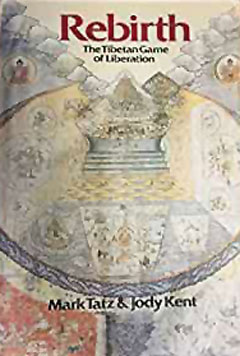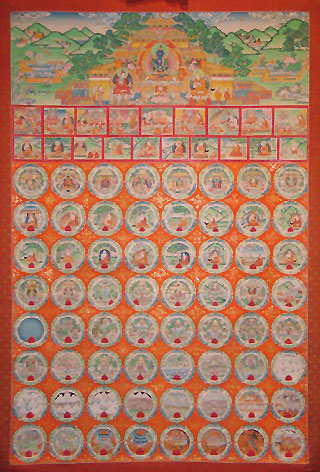Erb Unfolds ~ Page Three
Kaaaa EFF'n Boooom!
Kaboom
1. "Big Bang" does not necessarily indicate sex...
A). That which is known as Big Bang is related to panspermia; a ‘seeding process’ applied to remote areas of uninhabited space.
Some consider panspermia a frontier for the development of knowledge; providing an ability to work on lifetimes of accumulated karma, and related to universal set.
B). One 'remotely close' description of this process can be found in Rebirth: The Tibetan Game of Liberation:
by Mark Tatz and Jody Kent
@Amazon & @thriftbooks
[Note: If you get the book, make sure
paper, Insert game map is included.
Above links are reference; not profit]+ Playing with Karma by B. McGuire
and the only person who, amazingly, ‘nailed it’ (panspermia) was Terence McKenna; a constant visitor at an associate's living room, in San Francisco, where I would participate in some of the more amusing conversations unfolding.
C). It is also important to understand duality is an ’infinity-constant’ associated with advanced physics; where everything human is based on individual perspectivism, tied to intelligence development; ...that 'no matter where one is on an evolutionary development path, duality exists', and ‘everybody’ is capable of making mistakes; including maitreyas & celestials.
D). According to Wikipedia, the free encyclopedia, duality or dualism in cosmology or dualistic cosmology is the moral or spiritual belief that two fundamental concepts exist, which often oppose each other. It is an umbrella term that covers a diversity of views from various religions, including both traditional religions and scriptural religions.
Moral dualism is the belief of the great complement of, or conflict between, the benevolent and the malevolent. It simply implies that there are two moral opposites at work, independent of any interpretation of what might be "moral" and independent of how these may be represented. Moral opposites might, for example, exist in a worldview that has one god, more than one god, or none. By contrast, duotheism, bitheism or ditheism implies (at least) two gods. While bitheism implies harmony, ditheism implies rivalry and opposition, such as between good and evil, or light and dark, or summer and winter. For example, a ditheistic system could be one in which one god is a creator and the other a destroyer. In theology, dualism can also refer to the relationship between the deity and creation or the deity and the universe (see theistic dualism). That form of dualism is a belief shared in certain traditions of Christianity and Hinduism. Alternatively, in ontological dualism, the world is divided into two overarching categories. The opposition and combination of the universe's two basic principles of yin and yang is a large part of Chinese philosophy, and is an important feature of Taoism. It is also discussed in Confucianism.
Many myths and creation motifs with dualistic cosmologies have been described in ethnographic and anthropological literature. The motifs conceive the world as being created, organized, or influenced by two demiurges, culture heroes, or other mythological beings, who compete with each other or have a complementary function in creating, arranging or influencing the world. There is a huge diversity of such cosmologies. In some cases, such as among the Chukchi, the beings collaborate rather than compete, and they contribute to the creation in a coequal way. In many other instances the two beings are not of the same importance or power (sometimes, one of them is even characterized as gullible). Sometimes they can be contrasted as good versus evil. They may be often believed to be twins or at least brothers. Dualistic motifs in mythologies can be observed in all inhabited continents. Zolotaryov concludes that they cannot be explained by diffusion or borrowing but are rather of convergent origin. They are related to a dualistic organization of society (moieties); in some cultures, the social organization may have ceased to exist, but mythology preserves the memory in more and more disguised ways.
E). There have been multiple attempts to explain this (Vedas, Egyptian Book of the Dead, Bardo Thodol, Gilgamesh, Great Flood of Gun-Yu, Oahspe, Urantia Book, etc.), but conquerors have a habit of rewriting history to their advantage; which oddly relates to profits not people, and similar to a 'mind set' corporations have today.
Unfortunately, most important information has been seriously veiled, destroyed, or is being held by various, 'highly secret' societies, etc.
[Updated 202106.29, Corrections]
[Updated 202107.07, Corrections]
Previous page ~ Index ~ Next page

